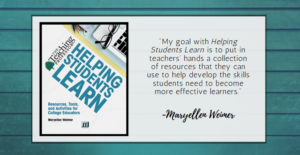
Vulnerability in the Classroom
Years ago, when I began my full-time teaching career in the university classroom, I was a mere 27 years old and fresh out of a

Years ago, when I began my full-time teaching career in the university classroom, I was a mere 27 years old and fresh out of a

Q: Why did the chicken cross the road? A: To show the squirrel it could be done. Most of us attempt to teach our subjects

One of the most popular guides for academic writing standards across the curriculum is scheduled for some changes. It’s been a decade since The American

The Focus is You will now occur just once a month. We have other exciting things to share with you on Thursdays, like our new,

As faculty, we want our students to achieve, but more than that we want our students to see, at least in some way, that what

To: My Students From: Your Teacher Re: What’s happening in college—is it real? I just read about a senior engineering student who was presenting a

As faculty members prepare to start their classes and courses for the 2019 school year, it’s important to remember that not all students attending college

To kickstart The Focus is You, a short Q&A that features a different Faculty Focus member every Thursday, we’re featuring Maryellen Weimer, editor of The

The approach to course reading described here is not the result of some altruistic action to save students money on textbooks. Nor was it a

Most would agree the classroom is a place for discourse, reflection, and learning. But, whose class is it? Who’s doing the learning—the teacher or the
Get exclusive access to programs, reports, podcast episodes, articles, and more!